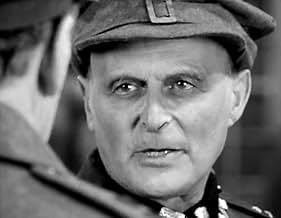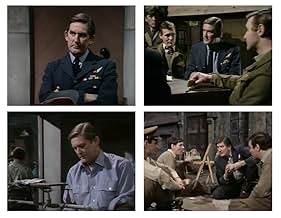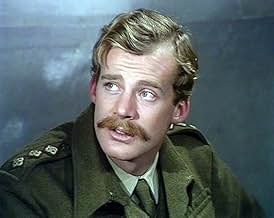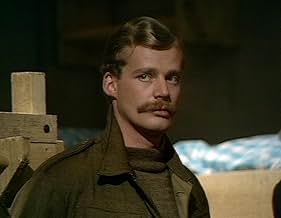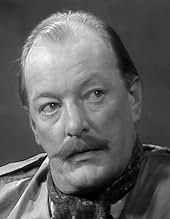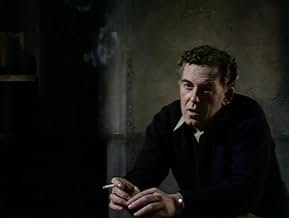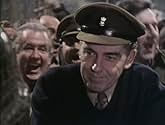Colditz
- Serie TV
- 1972–1974
- 50min
VALUTAZIONE IMDb
8,3/10
1111
LA TUA VALUTAZIONE
Aggiungi una trama nella tua linguaThe series deals with Allied prisoners of war imprisoned at Colditz Castle and their many attempts to escape captivity, as well as the relationships formed between the various nationalities ... Leggi tuttoThe series deals with Allied prisoners of war imprisoned at Colditz Castle and their many attempts to escape captivity, as well as the relationships formed between the various nationalities and their German captors.The series deals with Allied prisoners of war imprisoned at Colditz Castle and their many attempts to escape captivity, as well as the relationships formed between the various nationalities and their German captors.
- Nominato ai 3 BAFTA Award
- 1 vittoria e 3 candidature totali
Sfoglia gli episodi
Recensioni in evidenza
When the very popular and succesful "Family at War" series finished a new wartime drama was made about the stories and exploits of British prisoners of war being held at Oflag 4c known as Colditz. This BBC production ran two seasons from 1972 to 1974 and although repeated, perhaps twice, it wasn't shown again after it's final airing in 1975 until it was broadcast on UK Gold many years later. The series mostly centered around the British contingent and was filmed mostly on video which only added to the claustrophobic feel of being incarcerated. This castle deep inside Germany was used as a POW camp to house highly decorated or prominent captured service men as well as troublesome officers who were well known escapers. Other nationalities included French, Dutch, Polish as well as Americans.
The German captures were headed by the Kommandant a veteran of WW1 and strictly by the book man. Straight backed a committed patriot but dignified, took his responsibilities very seriously and felt that observing the Geneva convention was vital in helping German POW's deal with their captivity in allied POW camps, therefore, he was tough but fair. This was clearly on display when he finally understood Colonel Preston's predicament after the death of his wife in England and the compassionate act of not returning a letter with other personal effects to a dead serviceman's wife, giving the impression he'd never received the last letter.
He was supported by the very imposing Hauptmann Ulmann his security chief who was also committed to his duties but nevertheless earned the respect of the POW's as he too observed the Geneva convention. This was in sharp contrast to the Second in command Major Mohn who came in the second season. He was committed to the cause but arrogant as well as being a strong party member who had connections with the hierarchy in the Nazi movement. Although decorated and wounded in combat because of his underhanded methods towards his duties and his constant provocation towards the prisoners he eventually became despised.
The series found its feet in the 4th episode of the first season which centered on the arrival of Colonel Preston who became the senior British officer. After some initial resistance from the British prisoners, he soon gained the respect of them. Through his ability to command he brought a sense of purpose and discipline to the officers by initiating a rotation of officer of the day, daily orders being posted and the forming of an escape committee. The other main senior British officers were Captain Pat Grant the head of the escape committee, Flight Lieutenant Carrington, submariner Lieutenant Dick Player and the short tempered and moody flight Lieutenant Carter.
Despite the first series climaxing on a two-part episode with an attempted break out of four British officers, I think that season two was just slightly better, probably benefiting from the presence of the nasty Major Mohn. Two seasons were probably enough for the series and ended with the war coming to an end with the United States and Russian forces closing in on the castle. I think that a short 2-3-part miniseries a few years later centering around a reunion of some of the officers with the intention of tracking down Horst Mohn and trying to bring him to justice would have been satisfying. It didn't happen, nevertheless a great series to watch, I'd highly recommend Colditz.
The German captures were headed by the Kommandant a veteran of WW1 and strictly by the book man. Straight backed a committed patriot but dignified, took his responsibilities very seriously and felt that observing the Geneva convention was vital in helping German POW's deal with their captivity in allied POW camps, therefore, he was tough but fair. This was clearly on display when he finally understood Colonel Preston's predicament after the death of his wife in England and the compassionate act of not returning a letter with other personal effects to a dead serviceman's wife, giving the impression he'd never received the last letter.
He was supported by the very imposing Hauptmann Ulmann his security chief who was also committed to his duties but nevertheless earned the respect of the POW's as he too observed the Geneva convention. This was in sharp contrast to the Second in command Major Mohn who came in the second season. He was committed to the cause but arrogant as well as being a strong party member who had connections with the hierarchy in the Nazi movement. Although decorated and wounded in combat because of his underhanded methods towards his duties and his constant provocation towards the prisoners he eventually became despised.
The series found its feet in the 4th episode of the first season which centered on the arrival of Colonel Preston who became the senior British officer. After some initial resistance from the British prisoners, he soon gained the respect of them. Through his ability to command he brought a sense of purpose and discipline to the officers by initiating a rotation of officer of the day, daily orders being posted and the forming of an escape committee. The other main senior British officers were Captain Pat Grant the head of the escape committee, Flight Lieutenant Carrington, submariner Lieutenant Dick Player and the short tempered and moody flight Lieutenant Carter.
Despite the first series climaxing on a two-part episode with an attempted break out of four British officers, I think that season two was just slightly better, probably benefiting from the presence of the nasty Major Mohn. Two seasons were probably enough for the series and ended with the war coming to an end with the United States and Russian forces closing in on the castle. I think that a short 2-3-part miniseries a few years later centering around a reunion of some of the officers with the intention of tracking down Horst Mohn and trying to bring him to justice would have been satisfying. It didn't happen, nevertheless a great series to watch, I'd highly recommend Colditz.
This outstanding series is the kind of psychological drama at which the British excell. Set almost entirely within a reconstruction of the now-famous castle-fortress prisoner-of-war camp during WWII, there is little in the way of physical action. Instead we're treated to some of the best form of "mind games" and psychological manoeuvring and competition you can hope to see on TV, as the two sides constantly strive to get one over on the other. The Allied prisoners are determined not to be beaten mentally by their surroundings and look for every possible means of escape, while the Germans are always on their toes, looking for clues about possible break-outs and ways in which the Allied prisoners are trying to outsmart them. I couldn't tear myself away from the series when it first came out in Britain, and I was pleased to see how little it had aged when it was reshown on the History Channel a couple of years ago. Excellent acting and strong story lines make this a must-see for me. Out of 10, I'd rank it about 13.6!!
Some strange and uniformed comments/criticisms about this excellent series.
One says that was a 'goof' to show prisoners in 'dress uniforms'. A brief search for photos of Colditz prisoners online will show that all POW officers possessed proper uniforms, as under the Geneva Convention these could be requested via the Red Cross. It would have been an unlikely mistake, as Pat Reid was an adviser on the series.
Another says that there were no Americans in Colditz. There were in fact three Americans: Colonel Florimond Duke, Captain Guy Nunn, and Alfred Suarez.
Some liberties were clearly taken for dramatic effect. For example, the famous 'Tea Chest' escape is featured. David McCallum's character, Simon Carter was based on the real Tea Chest escaper, 'The Medium Sized Man' aka Fl Lt Dominic Bruce OBE MC AFM KSG (Wikipedia has a very comprehensive biography, well worth a read) who did not deliberately give himself up as Carter does, but was only caught weeks later in Danzig.
For the most part, this series gives a fairly accurate portrayal of the struggle between the inveterate escapers (you were only put in Colditz if you had escaped from somewhere else, and got caught) and the well trained German security officers.
One says that was a 'goof' to show prisoners in 'dress uniforms'. A brief search for photos of Colditz prisoners online will show that all POW officers possessed proper uniforms, as under the Geneva Convention these could be requested via the Red Cross. It would have been an unlikely mistake, as Pat Reid was an adviser on the series.
Another says that there were no Americans in Colditz. There were in fact three Americans: Colonel Florimond Duke, Captain Guy Nunn, and Alfred Suarez.
Some liberties were clearly taken for dramatic effect. For example, the famous 'Tea Chest' escape is featured. David McCallum's character, Simon Carter was based on the real Tea Chest escaper, 'The Medium Sized Man' aka Fl Lt Dominic Bruce OBE MC AFM KSG (Wikipedia has a very comprehensive biography, well worth a read) who did not deliberately give himself up as Carter does, but was only caught weeks later in Danzig.
For the most part, this series gives a fairly accurate portrayal of the struggle between the inveterate escapers (you were only put in Colditz if you had escaped from somewhere else, and got caught) and the well trained German security officers.
I saw Colditz when it first came out and much enjoyed seeing it again nearly fifty years later. There are no bad episodes, at the time of writing none are rated lower than 7.8. But there are very few reviews and I'm surprised more people don't seek out quality classic stuff rather than settle for the dreary rubbish now served up on tv.
Of the episodes I'd rate 10, Tweedledum is best loved, three reviews of it have said all that can usefully be said. In Ace in The Hole a new inmate, highly decorated RAF officer Tony Shaw (Jeremy Kemp) is polite but somewhat aloof, showing little interest in escaping. This is the most thoughtful episode, Shaw's riveting verbal dual with Major Mohn about the nature of military accomplishment is the best five minutes dialogue in the series. Among strong competition my favourite is The Gambler, in which Ray Barrett plays a ruthlessly amoral card sharp, by a country mile the most dislikeable prisoner.
I would have liked to have seen more of one or two interesting characters who appeared just once. Such as Major Schaeffer (Michael Gough) in Maximum Security, whose alcohol fuelled distain for the Third Reich would have made the perfect foil for Mohn. A couple of the regulars I suspect were there primarily for their looks, no names no pack drill as they say in the army.
Of the episodes I'd rate 10, Tweedledum is best loved, three reviews of it have said all that can usefully be said. In Ace in The Hole a new inmate, highly decorated RAF officer Tony Shaw (Jeremy Kemp) is polite but somewhat aloof, showing little interest in escaping. This is the most thoughtful episode, Shaw's riveting verbal dual with Major Mohn about the nature of military accomplishment is the best five minutes dialogue in the series. Among strong competition my favourite is The Gambler, in which Ray Barrett plays a ruthlessly amoral card sharp, by a country mile the most dislikeable prisoner.
I would have liked to have seen more of one or two interesting characters who appeared just once. Such as Major Schaeffer (Michael Gough) in Maximum Security, whose alcohol fuelled distain for the Third Reich would have made the perfect foil for Mohn. A couple of the regulars I suspect were there primarily for their looks, no names no pack drill as they say in the army.
10aejm
Being a great fan of Secret Army, I am one of the many people who have bought up the recent DVD release ... and from what I understand ... the producers did Colditz before SA ... it won British Academy Awards and was extremely popular.
After the great success of the Secret Army DVD releases, isn't it time Colditz was released on DVD too? I would definitely buy it. What do you think guys?
There is just so much good stuff from the 1970's and 60's .... it was a classic period
The more people asking for some of it on DVD, the more likely we are to actually have it released.
After the great success of the Secret Army DVD releases, isn't it time Colditz was released on DVD too? I would definitely buy it. What do you think guys?
There is just so much good stuff from the 1970's and 60's .... it was a classic period
The more people asking for some of it on DVD, the more likely we are to actually have it released.
Lo sapevi?
- QuizThe series takes place from May 1940 to April 1945.
- BlooperAll of the prisoners are seen dressed in impeccable uniforms, from uniform caps with insignia down to highly polished boots. The shirts and pants are clean and pressed, and the senior officers even have ties. None of these would have been carried into battle, and even if they had been, would surely have shown signs of wear after years in prison camps. In reality the prisoners had to make due with whatever they could gather together, certainly not the high quality uniforms featured in the series.
- ConnessioniFeatured in Night of a Thousand Shows (2000)
I più visti
Accedi per valutare e creare un elenco di titoli salvati per ottenere consigli personalizzati
- How many seasons does Colditz have?Powered by Alexa
Dettagli
- Data di uscita
- Paese di origine
- Lingue
- Celebre anche come
- La fuga de Colditz
- Luoghi delle riprese
- Stirling Castle, Stirling, Scozia, Regno Unito(Title sequence and exteriors)
- Aziende produttrici
- Vedi altri crediti dell’azienda su IMDbPro
Contribuisci a questa pagina
Suggerisci una modifica o aggiungi i contenuti mancanti

